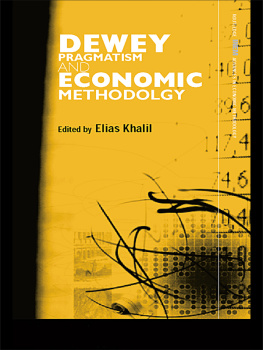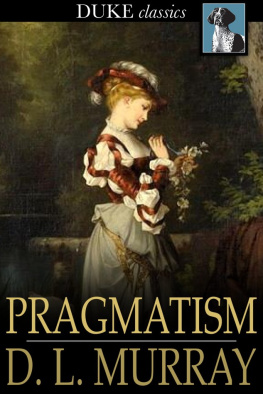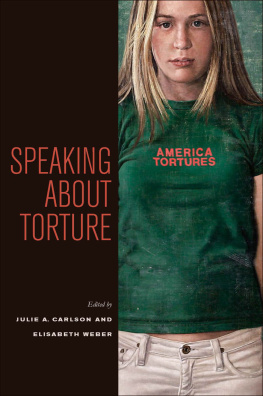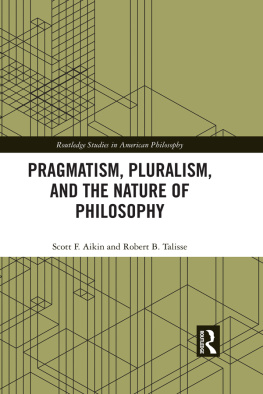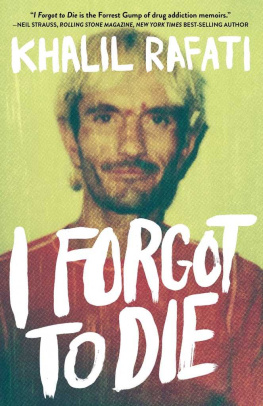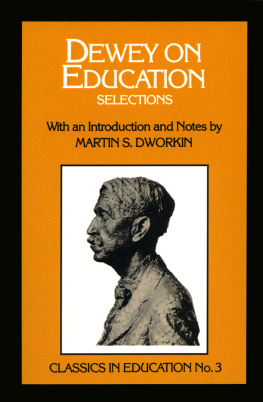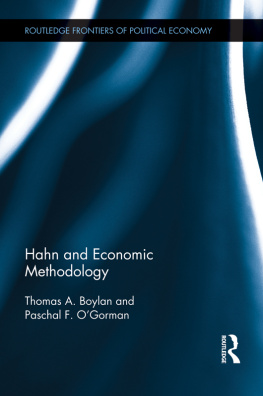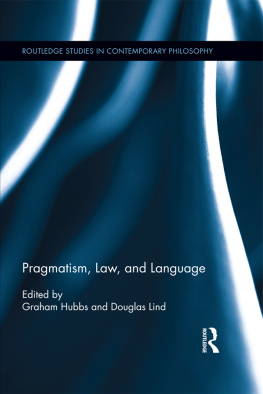Khalil - Dewey, pragmatism, and economic methodology
Here you can read online Khalil - Dewey, pragmatism, and economic methodology full text of the book (entire story) in english for free. Download pdf and epub, get meaning, cover and reviews about this ebook. City: London, year: 2012, publisher: Routledge, genre: Romance novel. Description of the work, (preface) as well as reviews are available. Best literature library LitArk.com created for fans of good reading and offers a wide selection of genres:
Romance novel
Science fiction
Adventure
Detective
Science
History
Home and family
Prose
Art
Politics
Computer
Non-fiction
Religion
Business
Children
Humor
Choose a favorite category and find really read worthwhile books. Enjoy immersion in the world of imagination, feel the emotions of the characters or learn something new for yourself, make an fascinating discovery.
- Book:Dewey, pragmatism, and economic methodology
- Author:
- Publisher:Routledge
- Genre:
- Year:2012
- City:London
- Rating:4 / 5
- Favourites:Add to favourites
- Your mark:
- 80
- 1
- 2
- 3
- 4
- 5
Dewey, pragmatism, and economic methodology: summary, description and annotation
We offer to read an annotation, description, summary or preface (depends on what the author of the book "Dewey, pragmatism, and economic methodology" wrote himself). If you haven't found the necessary information about the book — write in the comments, we will try to find it.
Khalil: author's other books
Who wrote Dewey, pragmatism, and economic methodology? Find out the surname, the name of the author of the book and a list of all author's works by series.
Dewey, pragmatism, and economic methodology — read online for free the complete book (whole text) full work
Below is the text of the book, divided by pages. System saving the place of the last page read, allows you to conveniently read the book "Dewey, pragmatism, and economic methodology" online for free, without having to search again every time where you left off. Put a bookmark, and you can go to the page where you finished reading at any time.
Font size:
Interval:
Bookmark:

The writings of the American philosopher John Dewey contend systematically with metaphysics, epistemology, logic, philosophy education, aesthetics, social problems, and public policy. Given the recent revival of Deweys legacy, it is surprising that the ramifications of his thought have not been explored in relation to economic theory and the philosophy of economics.
This book brings together, for the first time, philosophers of pragmatism and economists interested in methodological questions. The main theoretical thrust of Dewey is to unite inquiry with behavior, and this books contributions assess this insight in the light of developments in modern American philosophy, social and legal theories, and the theoretical orientation of economics.
This unique book contains impressive contributions from a range of different perspectives and its unique nature will make it required reading for academics involved with philosophy and economics.
Elias L. Khalil is a member of the faculty of Vassar College. His main research interests are behavioral economics and organizational economics. His recent publications include Trust (Edward Elgar, 2003), Information, Knowledge and the Close of Friedrich Hayeks System (Eastern Economic Journal, 2002), and Is Adam Smith Liberal? (Journal of Institutional and Theoretical Economics, 2002).
Professor of Economics, University of Puget Sound, Tacoma, USA
The field of economic methodology has expanded rapidly during the last few decades. This expansion has occurred in part because of changes within the discipline of economics, in part because of changes in the prevailing philosophical conception of scientific knowledge, and also because of various transformations within wider society. Research in economic methodology now reflects not only developments in contemporary economic theory, the history of economic thought, and the philosophy of science; it also reflects developments in science studies, historical epistemology, and social theorizing more generally. The field of economic methodology still includes the search for rules for the proper conduct of economic science, but it also covers a vast array of other subjects and accommodates a variety of different approaches to those subjects.
The objective of this series is to provide a forum for the publication of significant works in the growing field of economic methodology. Since the series defines methodology quite broadly, it will publish books on a wide range of different methodological subjects. The series is also open to a variety of different types of works: original research monographs, edited collections, as well as re-publication of significant earlier contributions to the methodological literature. The International Network for Economic Methodology (INEM) is proud to sponsor this important series of contributions to the methodological literature.
Foundations of Economic Method, 2nd Edition
A Popperian perspective
Lawrence A. Boland
Applied Economics and the Critical Realist Critique
Edited by Paul Downward
Dewey, Pragmatism and Economic Methodology
Edited by Elias L. Khalil
First published 2004
by Routledge
11 New Fetter Lane, London EC4P 4EE
Simultaneously published in the USA and Canada
by Routledge
29 West 35th Street, New York, NY 10001
Routledge is an imprint of the Taylor & Francis Group
This edition published in the Taylor & Francis e-Library, 2005.
To purchase your own copy of this or any of Taylor & Francis or Routledges collection of thousands of eBooks please go to www.eBookstore.tandf.co.uk.
2004 American Insitute for Economic Research
All rights reserved. No part of this book may be reprinted or reproduced or utilized in any form or by any electronic, mechanical, or other means, now known or hereafter invented, including photocopying and recording, or in any information storage or retrieval system, without permission in writing from the publishers.
British Library Cataloguing in Publication Data
A catalogue record for this book is available from the British Library
Library of Congress Cataloging in Publication Data
A catalog record for this title has been requested
ISBN 0-203-79990-9 Master e-book ISBN
ISBN 0-203-68245-9 (Adobe eReader Format)
ISBN 0415700140 (Print edition)
Richard J. Bernstein is Vera List Professor of Philosophy at the Graduate Faculty, New School University. He specializes in the study of American pragmatism, social and political philosophy, and critical theory. His most recent books include The New Constellation: The EthicalPolitical Horizons ofModernity/Postmodernity (MIT Press, 1991), Hannah Arendt and the JewishQuestion (1996), Freud and the Vexed Legacy of Moses (Cambridge University Press, 1998), and Radical Evil: A Philosophical Interrogation (Polity Press, 2002).
Peter J. Boettke is a Professor of Economics at George Mason University. Prior to joining GMU, Boettke taught at New York University and was a National Fellow at the Hoover Institution at Stanford University. He is the author of The Political Economy of Soviet Socialism: The Formative Years,19181928 (Kluwer Academic, 1990), Why Perestroika Failed (Routledge, 1993), and Calculation and Coordination (Routledge, 2001). He is the co-author of The Economic Way of Thinking (Prentice Hall, 2002).
Tom Burke is Associate Professor in the Department of Philosophy at the University of South Carolina. He is co-editor of Deweys Logical Theory:New Studies and Interpretations (Vanderbilt University Press, 2002) and is author of Deweys New Logic: A Reply to Russell (University of Chicago Press, 1994).
Vincent Colapietro is Professor of Philosophy at Penn State University. His current projects include the study of psyches and their vicissitudes, and the relation between pragmatism and psychoanalysis. His recent publications include The Speculative Reconsidered (Journal of Speculative Philosophy, 2002), Robust Realism and Real Externality: The Complex Commitments of a Convinced Pragmaticist (Semiotica, 2000), Lets All Go To The Movies: Two Thumbs Up for Hugo Munsterbergs The Photoplay (1916) (Transactions of Charles S. Peirce Society, 2000), and FatefulShapes of Human Freedom (Vanderbilt University Press, 2003).
Stanley Fish is Dean of the College of Liberal Arts and Sciences at the University of Illinois at Chicago. He is the author of many books, including: Surprised by Sin: The Reader in Paradise Lost (1967; and a 30th anniversary edition, Harvard University Press 1997); The Living Temple:George Herbert and Catechizing (University of California Press, 1978); IsThere a Text in This Class? Interpretive Communities and the Sources ofAuthority (Harvard University Press, 1980); Theres No Such Thing as FreeSpeech, and Its a Good Thing, Too (Oxford University Press, 1994); TheTrouble with Principle (Harvard University Press, 1999); and How MiltonWorks (Harvard University Press, 2001). The Stanley Fish Reader, edited by H. Aram Veeser, was published by Blackwell in 1999.
D. Wade Hands is Professor of Economics at the University of Puget Sound in Tacoma, WA. He has published widely on various topics in the history of economic thought and economic methodology. His most recent book is
Font size:
Interval:
Bookmark:
Similar books «Dewey, pragmatism, and economic methodology»
Look at similar books to Dewey, pragmatism, and economic methodology. We have selected literature similar in name and meaning in the hope of providing readers with more options to find new, interesting, not yet read works.
Discussion, reviews of the book Dewey, pragmatism, and economic methodology and just readers' own opinions. Leave your comments, write what you think about the work, its meaning or the main characters. Specify what exactly you liked and what you didn't like, and why you think so.

